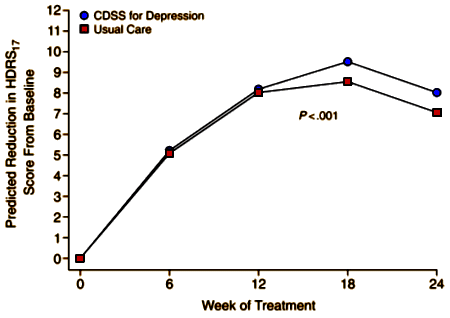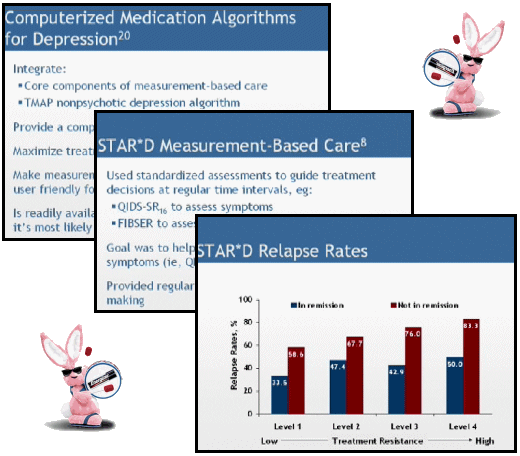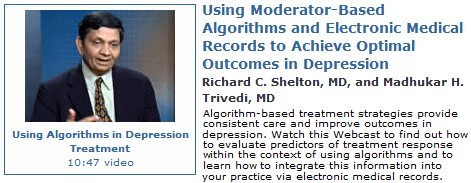The most amazing thing about humans is that we do the same things over and over, often uncolored by previous experiences. This idea of treating Major Depressive Disorder with some kind of Medication Algorithm directed by a computer program is one of those things that has trouble dying [at least in Dallas]. Notice [3] and [6] are about barriers. Well there were so many barriers that they never even completed the study [probably because the clinicians didn’t cooperate] and ended up publishing a pilot study with a small number of patients [7]:
| 1. | Computerized medication algorithms and decision support systems in major psychiatric disorders. Trivedi MH, Kern JK, Baker SM, et al: Journal of Psychiatric Practice 6:237–246, 2000 |
| 2. | Computerized medical algorithms in behavioral health care, in Behavioral Health Care Informatics. Trivedi MH, Kern JK, Voegle T, et al: Edited by Dewan NA, Lorenzi N, Riley R, Bhattacharya SR. New York, Springer-Verlag, 2001 |
| 3. | Development and implementation of computerized clinical guidelines: barriers and solutions. Trivedi MH, Kern JK, Marcee AK, et al: Methods of Information in Medicine 41:435–442, 2002 |
| 4. | A Computerized Clinical Decision Support System as a Means of Implementing Depression Guidelines. Trivedi MH, Kern JK, et al: Psychiatric Services 55:879–885, 2004 |
| 5. | Assessing physicians’ use of treatment algorithms: Project IMPACTS study design and rationale. Trivedi MH, Claassen CA, et al: Contemp Clin Trials. 28(2):192-212, 2007 |
| 6. | Barriers to implementation of a computerized decision support system for depression: an observational report on lessons learned in "real world" clinical settings. Trivedi MH, Daly EJ, Kern JK, et al: BMC Medical Informatics and Decision Making, 9:6, 2009 |
| 7. | A computerized decision support system for depression in primary care. Kurian BT, Trivedi MH, Grannemann BD, et al: Primary Care Companion, Journal of Clinical Psychiatry,11(4):140-1466, 2009 |
| 8. | Using algorithms and computerized decision support systems to treat major depression. Shelton RC and Trivedi MH: Journal of Clinical Psychiatry,72(12):e36, 2011 |
Why publish these lackluster results?

It’s probably because they were partially on the NIMH nickle [or should I say NICKLE?] also reporting funding by Pfizer:
| COMPUTERIZED DECISION SUPPORT SYSTEM FOR DEPRESSION | ||||
| PROJECT | PRINCIPLE INVESTIGATOR | YEAR | FUNDING | AMOUNT |
| 1R01MH064062-01A2 | TRIVEDI, MADHUKAR H | 2003 | NIMH | $604,135 |
| 5R01MH064062-02 | TRIVEDI, MADHUKAR H | 2004 | NIMH | $698,180 |
| 5R01MH064062-03 | TRIVEDI, MADHUKAR H | 2005 | NIMH | $717,974 |
| 5R01MH064062-04 | TRIVEDI, MADHUKAR H | 2006 | NIMH | $718,293 |
| 5R01MH064062-05 | TRIVEDI, MADHUKAR H | 2007 | NIMH | $605,420 |
| TOTAL |
$3,344,002 | |||
So after the rise and fall of TMAP’s algorithms and the exposure of its corruption, then the largely inconsequential STAR*D algorithm, the non-completion of IMPACTS [the study above], and the non-results from CO-MED, one would think we’d be done with computer assisted algorithms for directing antidepressant selection in MDD [coming out of Texas]. But then in June 2011, there was this C.M.E.:
With slides with all our old friends: TMAP, STAR*D, QIDS-SR16, FIBSER [bunnies added by yours truly]:

I wondered if there were a paper coming soon. Sure enough, it’s number [8] up top completing the circle – published in December 2011. I looked in the NIH RePORTER and Clinical Trials to see if there’s a grant or trial for running this whole thing around yet again, but nothing so far.
I know I’ve reported on this with each new iteration. I guess it’s gotten to be something of a hobby. This whole thing is based on the fantasy that if the doctors would all select treatment with a computer delivered algorithm [recipe] using measurement-based parameters [the QIDS-SR16 Rating Scale] that fed directly into the electronic medical records, the patients would get better results.  There’s even a phone operated system for collecting the QIDS-SR16IVR. No piece of this fantasy has ever worked. The drop out rates are fairly brisk and at least one study was scrapped for lack of interest.
There’s even a phone operated system for collecting the QIDS-SR16IVR. No piece of this fantasy has ever worked. The drop out rates are fairly brisk and at least one study was scrapped for lack of interest.

The vending machine scenario could yet come to pass, see http://survivingantidepressants.org/index.php?/topic/171-health-industry-group-replace-psychiatrists-with-vending-machines